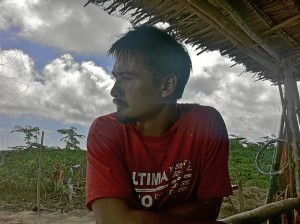
DIRECTOR Adolfo Alix Jr. (left) worked nonstop in Palawan, recalls Ananda Everingham. PHOTO COURTESY OF PHOENIX FEATURES
Although he is best known for the Thai horror hit “Shutter,” which was remade as a Hollywood flick, Laotian-Australian actor Ananda Everingham has balanced his “commercial work” with involvement in art-house projects.
Visitors to Bangkok invariably encounter Everingham, whose face is on billboards and posters all over the city.
Time was when Thai cinema, powered by young indie visionaries, was among the most dynamic in the world, he recalled in an exclusive interview with the Inquirer.
“Then it stagnated,” he said. “Government instability didn’t help. Now, we are struggling.”
To help revitalize the industry, he makes use of his celebrity by championing significant projects. “I am in a unique position. I was never under contract with a studio, so it’s been easier for me to pursue and create my own projects,” he noted.
He formed his own company, Halo, which has gone into film and TV production. “As a producer, I started out a bit too idealistic,” he admitted. “I’ve since realized that, to continue making the movies I want, I should make the company sustainable. My commercial work supports my more abstract, indie films.”
In Thailand, he has three projects in the can: “Fatherland,” a political-action-drama about religious strife; “Concrete Clouds,” an art film set amidst the 1997 Asian economic crisis; and “Shambala,” a road movie about two brothers in Tibet.
He coproduced “Shambala” which, he explained, is Tibetan for nirvana.
“We spent a month in Tibet,” he related. “It was madness. It was right after the earthquake and we faced a lot of difficulty and bureaucratic red tape.”
Still, he was mesmerized by Tibet. “I had never been anywhere with such stunning landscape,” he enthused. “When you’re there, you feel so tiny. I’d love to go back there.”
Another place he would certainly love to revisit is the Philippines. Just like Taiwanese pop star Ken Zhu before him, Everingham has made a movie with Filipino director Adolf Alix Jr. (He left shortly after this interview.)
In 2007, Zhu worked on Alix’s and John David Hukom’s “Batanes.” This year, Alix brought Everingham to Palawan to shoot “Kalayaan,” an entry in the Directors’ Showcase section of this year’s Cinemalaya Philippine Independent Film Festival.
Everingham said that he and Alix first talked about collaborating six years ago: “He gave me a copy of his debut film ‘Donsol’ when we met at the Bangkok Film Festival. [After that] we’d meet in different festivals and I’d ask Adolf about our film. Last time we saw each other was in Fukuoka (Japan) in September. He brought ‘Chassis’ there; I brought ‘Red Eagle.’ Then we met again in Chiang Mai (Thailand) where I am based. Finally, our film pushed through.”
“Kalayaan” is about a lonely soldier stationed in Spratly Islands. “Aside from the underlying political issue, what appealed to me was the idea of isolation,” he said. “I play a Filipino soldier who has been traumatized and thus barely speaks.”
Shooting on two Palawan islands, Cowrie and Luli, he was amazed by his director’s stamina. “Adolf worked nonstop. But it was a fun shoot.”
He was also impressed by the commitment of the Filipinos in the cast—Zanjoe Marudo, Luis Alandy, Rocky Salumbides, Evelyn Vargas and Angeli Bayani.
“It was refreshing,” Everingham said. “I heard that Zanjoe and Luis are mainstream actors, but they had the sensibility and dedication that the film required.”

